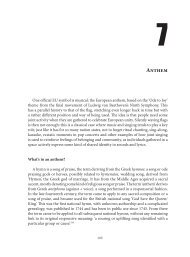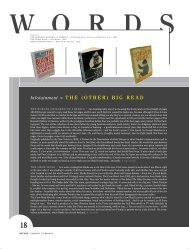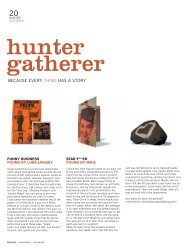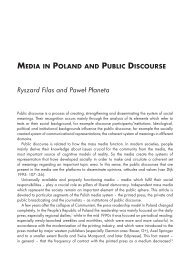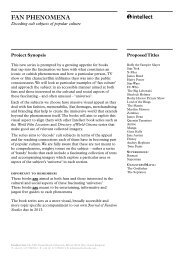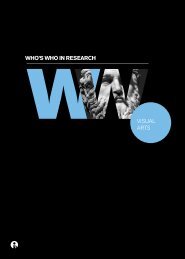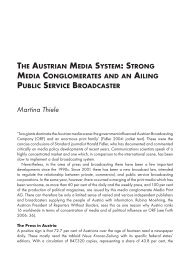Andrea Czepek, Melanie Hellwig and Eva Nowak - Intellect
Andrea Czepek, Melanie Hellwig and Eva Nowak - Intellect
Andrea Czepek, Melanie Hellwig and Eva Nowak - Intellect
You also want an ePaper? Increase the reach of your titles
YUMPU automatically turns print PDFs into web optimized ePapers that Google loves.
242 | PRESS FREEDOM AND PLURALISM IN EUROPE<br />
have picked up again considerably since the alleged economic struggles of newspapers in the<br />
late 1990s. In Cologne, M. Dumont Schauberg, publisher of the Kölner Stadt-Anzeiger, bought<br />
the competing Kölnische Rundschau <strong>and</strong> now owns both daily newspapers <strong>and</strong> a daily tabloid<br />
in the city of Cologne as well as the Mitteldeutsche Zeitung, a large newspaper in former East<br />
Germany. The sale was approved by the authorities at the time with Dumont reasoning that<br />
by saving the competing paper from bankruptcy they were actually safeguarding plurality,<br />
an argument which had already been used by the publishers of the WAZ when they bought<br />
competing newspapers in the Ruhr Area. Both WAZ <strong>and</strong> Dumont, as well as the Axel Springer<br />
AG, which, in addition to the large tabloid Bild-Zeitung (circulation ca. 4 million), owns several<br />
daily newspapers in northern Germany, Hamburg <strong>and</strong> Berlin, promised to keep the newsrooms<br />
of their newspapers strictly separate <strong>and</strong> give them editorial autonomy. In the long run, however,<br />
this principle has been eroded more <strong>and</strong> more. WAZ-newspapers have common newsrooms for<br />
certain topics such as local sports; the Springer-newspapers Die Welt <strong>and</strong> Morgenpost have<br />
merged their newsrooms in Berlin (Axel Springer Verlag 2001). In an ambience of regional<br />
monopolization <strong>and</strong> the absence of competition, newspapers have fewer incentives to report<br />
critically <strong>and</strong> disclose grievances.<br />
In Berlin in 2004, however, when Holtzbrinck planned to buy the daily newspaper Berliner<br />
Zeitung from Gruner & Jahr (who had bought the former communist party newspaper in<br />
East Berlin from the trust fund) the federal merger control authority would not go along<br />
with the internal-plurality argument. Holtzbrinck already owned another large (West-)Berlin<br />
newspaper, the Tagesspiegel. The authorities would only allow the purchase if Holtzbrinck sold<br />
the Tagesspiegel, because with both newspapers they would acquire a 61.4 per cent market<br />
share among subscription newspapers (not counting the tabloid Bild from Springer). Holtzbrinck<br />
first sold the Tagesspiegel to a former Holtzbrinck manager, a deal which was not accepted by<br />
the merger control authorities. Finally, Holtzbrinck was not allowed to buy the Berliner Zeitung<br />
(see, for example, Die Welt 2004). This case shows that the German merger control is still<br />
guided by the objective of safeguarding external pluralism of newspaper ownership. It also<br />
shows, however, that in doing so they might find themselves between a rock <strong>and</strong> a hard place:<br />
subsequently, in 2005 the Berliner Zeitung was sold to a foreign investor, the British private<br />
equity fund Mecom headed by David Montgomery. Mecom did not yet own any newspapers<br />
in Berlin, thus the merger control law did not apply. Mecom has since prescribed harsh austerity<br />
measures <strong>and</strong> high profit margins to the Berliner Zeitung; the current manager is also the editorin-chief<br />
(a mingling of economic <strong>and</strong> editorial responsibilities unusual in German publishing<br />
houses) <strong>and</strong> many editorial staff members <strong>and</strong> managers were laid off or have left in dissent<br />
(Roether 2005; epd Medien 2008b; Meier 2008).<br />
As these examples show, both the regional concentration processes <strong>and</strong> the increasing<br />
investment of foreign <strong>and</strong> non-publishing investors enhance the dominance of economic values<br />
in publishing companies; cost reduction <strong>and</strong> profit maximization have become the dominant<br />
goals <strong>and</strong> have pushed aside public values, such as providing diverse <strong>and</strong> well researched<br />
information.<br />
Resources, working conditions <strong>and</strong> outsourcing of journalism<br />
On an institutional <strong>and</strong> individual level, limitations for diversity <strong>and</strong> independent reporting are<br />
caused by the declining resources for journalistic work. With profit maximization being the main



